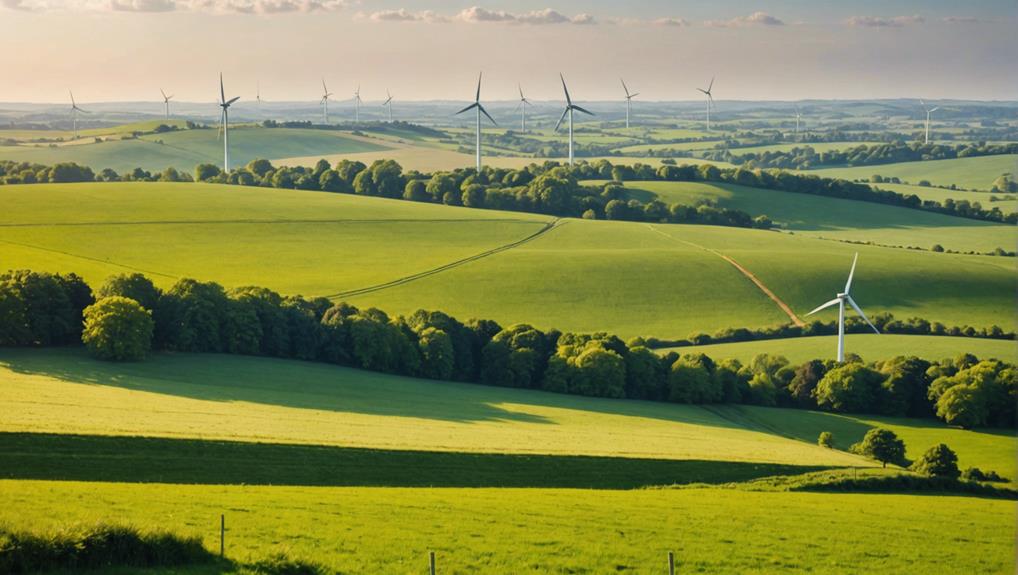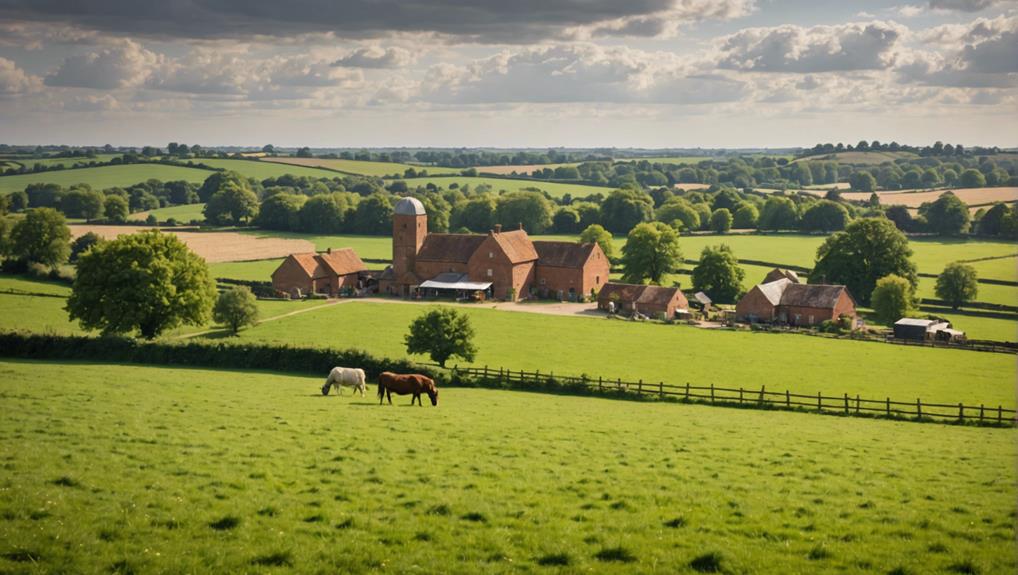The bustling town of Aylesbury is bracing itself for significant travel disruptions as a crucial thoroughfare into the town is […]
As you explore Buckinghamshire's agricultural landscape, you'll discover a thriving industry embracing innovative practices. Sustainable farming methods, precision agriculture, and renewable energy are just a few trends shaping the industry. The demand for local produce is on the rise, driving the growth of agri-tourism and small-scale farming ventures. Environmental stewardship initiatives and technology adoption are also becoming increasingly important. From data-driven farming to diversified revenue streams, Buckinghamshire's agricultural industry is evolving. As you continue to uncover the nuances of this dynamic landscape, you'll find even more insights waiting to be uncovered.
Key Takeaways
• Farmers in Buckinghamshire are adopting sustainable practices, including crop rotation and reduced pesticide use, to promote soil health and biodiversity.
• Precision farming, using GPS, sensors, and drones, is optimizing crop yields and minimizing environmental impact in Buckinghamshire.
• Renewable energy sources, such as solar panels and wind turbines, are being adopted by farmers to reduce their carbon footprint and benefit from financial incentives.
• There is a growing demand for local produce in Buckinghamshire, with a 30% surge in sales, driven by consumers seeking freshness, quality, and sustainability.
• Small-scale farming ventures are on the rise in Buckinghamshire, offering niche products and prioritizing sustainable practices and community engagement.
Embracing Sustainable Farming Practices
As you explore the agricultural landscape of Buckinghamshire, you'll notice a growing number of farmers embracing sustainable practices that not only benefit the environment but also their bottom line.
By adopting methods like crop rotation and reduced pesticide use, farmers are taking steps to protect the environment while maintaining a profitable business.
One key aspect of sustainable farming is soil health, which is critical for long-term fertility and ecosystem balance. By integrating agroforestry methods, farmers can improve soil health, increase biodiversity, and even contribute to carbon sequestration.
This innovative approach not only enhances environmental sustainability but also provides an opportunity for farmers to diversify their income streams.
Precision Farming in Buckinghamshire
By leveraging cutting-edge technologies like GPS, sensors, and drones, you can revolutionize crop production in Buckinghamshire with precision farming. This innovative approach enables farmers to optimize crop yields, reduce waste, and minimize environmental impact.
By employing precision farming techniques, you can create detailed maps of your fields, allowing for targeted management practices and precise application of fertilizers, pesticides, and water based on real-time data. Data analytics plays an essential role in precision farming, helping you make informed decisions about crop monitoring and resource allocation.
With precision farming, you can monitor crop health, detect early signs of stress, and take proactive measures to prevent disease and pest damage. As you adopt precision farming practices, you'll notice a significant increase in efficiency, reduced costs, and a lower environmental footprint.
It's no wonder that the adoption of precision farming in Buckinghamshire is steadily on the rise, as farmers aim to meet the demands of modern agriculture.
Renewable Energy in Agriculture

You're taking a significant step towards reducing your farm's carbon footprint by harnessing renewable energy sources in Buckinghamshire. By adopting energy efficient solutions, you're not only contributing to a sustainable future but also benefiting from financial incentives.
The government's Renewable Heat Incentive (RHI) scheme, for instance, encourages farmers to explore renewable heating options like heat pumps and solar thermal systems.
In Buckinghamshire, many farms are already investing in green technology, such as solar panels and wind turbines, to generate sustainable energy. Biomass boilers and anaerobic digesters are also on the rise, providing alternative energy sources.
Collaborations between agricultural businesses and renewable energy providers are promoting the adoption of green energy solutions in the farming sector. This partnership also opens up opportunities for knowledge-sharing and innovation.
Growing Demand for Local Produce
In response to the growing clamor for freshness and quality, Buckinghamshire's farmers are reaping the benefits of a 30% surge in local produce sales over the past year.
You're likely contributing to this trend, as are many of your neighbors, by seeking out fresh, locally grown food. This shift towards consuming local produce is driven by a desire for freshness, quality, and sustainability.
As a result, you're seeing more farmers markets, with a 20% rise in attendance from local residents. Restaurants are also jumping on the bandwagon, increasingly sourcing ingredients from nearby farms and producers.
This farm-to-table movement is a key aspect of community-supported agriculture, where consumers directly support local farmers through direct marketing channels, such as food hubs. By cutting out middlemen, you're getting the freshest produce while supporting the local economy.
As you shop for groceries or dine out, you're part of a growing movement that's changing the face of Buckinghamshire's agriculture.
Rise of Agri-Tourism in Buckinghamshire

As you explore the rolling hills and picturesque countryside of Buckinghamshire, you can now immerse yourself in the world of agriculture through agri-tourism, a burgeoning industry that's changing the face of rural tourism. This trend offers a unique chance to engage with the agricultural process, from milking cows to harvesting crops.
By participating in farm-to-table experiences, you can savor fresh produce and dairy products straight from the source.
Here are some exciting aspects of agri-tourism in Buckinghamshire:
- Get hands-on experience with farming activities, like harvesting and milking
- Enjoy farm-to-table experiences, tasting fresh produce and dairy products
- Contribute to the local economy by supporting sustainable farming practices
- Engage in cultural exchange with local farmers, learning about their daily lives and traditions
The growth of agri-tourism in Buckinghamshire has a significant economic impact, attracting tourists interested in sustainable farming practices. This, in turn, benefits local farmers who can diversify their income streams.
As you explore Buckinghamshire's agritourism sites, you'll not only gain insight into the agricultural process but also contribute to the local economy.
Small-Scale Farming on the Rise
Buckinghamshire's rural landscape is witnessing a surge in small-scale farming ventures, driven by a growing passion for sustainable agriculture and locally sourced produce. As you explore the countryside, you'll notice a proliferation of small farms specializing in niche products like organic vegetables, rare breed livestock, artisanal cheeses, and farm-to-table experiences. These ventures are contributing to a more diverse and resilient agricultural landscape.
By engaging with the community through farmers' markets, community-supported agriculture (CSA) programs, and farm-to-school initiatives, small-scale farmers are fostering a sense of farm diversity and community engagement. This trend is having a significant economic impact, creating new market opportunities and supporting the local economy.
With more people choosing to start their own farms, the demand for resources and land is increasing, but the benefits of small-scale farming far outweigh the challenges. As you explore the changing agricultural landscape of Buckinghamshire, you'll discover a vibrant and thriving community of small-scale farmers committed to sustainable practices and community engagement.
Environmental Stewardship Initiatives

You'll find that Buckinghamshire's farmers are committed to protecting the natural beauty of their surroundings through Environmental Stewardship initiatives. These initiatives play an essential role in promoting sustainable agriculture practices that benefit the environment. By participating in schemes like Countryside Stewardship, farmers in Buckinghamshire are able to manage their land in a way that conserves natural resources and promotes biodiversity.
Some key aspects of Environmental Stewardship initiatives in Buckinghamshire include:
- Protecting and enhancing wildlife habitats through conservation efforts
- Promoting biodiversity by planting diverse crops and maintaining ecological balance
- Implementing sustainable farming practices to reduce carbon footprint and conserve water resources
- Adopting environmentally friendly practices to enhance soil health and reduce pollution
Through these initiatives, Buckinghamshire's agriculture sector is actively contributing to the conservation of the local environment. By adopting environmentally friendly practices, farmers aren't only protecting the natural beauty of the area but also ensuring a sustainable future for their farms.
Technology Adoption in Farming
In addition, farmers in Buckinghamshire are harnessing the power of technology to revolutionize their farming practices. They are making data-driven decisions to boost yields and reduce waste. By adopting precision agriculture technologies like GPS-guided tractors and drones, farmers can efficiently manage crops and make the most of their land.
The use of sensors and data analytics tools allows farmers to monitor soil moisture, nutrient levels, and plant health in real-time. This enables them to make informed decisions about irrigation, fertilization, and pest control. Automation efficiency is also on the rise, with robotic milkers and harvesters streamlining labor-intensive tasks.
Additionally, smart irrigation systems adjust water usage based on weather conditions and crop needs, conserving water and improving yields. Farm management software solutions enable farmers to analyze production, finances, and resource allocation to optimize operations. The impact of data analytics is significant, enabling farmers to identify areas for improvement and make adjustments to maximize returns.
Diversification of Farming Operations

By venturing beyond traditional farming practices, you can capitalize on new revenue streams and secure the long-term sustainability of your agricultural business. In Buckinghamshire, farmers are diversifying their operations to stay competitive in the market. This shift towards diversification has led to innovative agritourism activities, such as:
- Farm stay experiences and educational tours, allowing visitors to connect with rural life
- Farm weddings and festivals, offering unique event spaces and memorable experiences
- Pick-your-own fruit and farm shops selling local produce, promoting local consumption and community engagement
- Farm cafes and farm-based recreational activities, enhancing the overall farm experience
Frequently Asked Questions
What Is the Buckinghamshire Energy Strategy?
You'll find the Buckinghamshire Energy Strategy is a plan to reduce carbon emissions by 2050, focusing on renewable incentives like solar and wind power, plus rural electrification, to create a sustainable future.
What Is the Future of UK Farming?
You'll likely see UK farming's future shaped by Brexit's impact on trade and subsidies, as well as innovative farming technologies, such as precision agriculture, to boost efficiency and sustainability.
What Are the Biggest Farming Counties in the Uk?
As you explore the UK's farming hotspots, you'll find Devon, Lincolnshire, Essex, Yorkshire, and Norfolk leading the way, with their vast rural landscapes and specialized farming practices, making them the biggest farming counties in the UK.
What Is the Agriculture Industry in the Uk?
You're likely aware that the UK's agriculture industry contributes over £120 billion annually, with farm subsidies supporting farmers and livestock diversification helping them thrive in a competitive market.
Conclusion
As you've seen, Buckinghamshire's agriculture is evolving. Sustainable practices, precision farming, and renewable energy are becoming the norm.
The demand for local produce is on the rise, and agri-tourism is gaining traction. Small-scale farming is making a comeback, and environmental initiatives are taking center stage.
Technology is transforming farming operations, and diversification is key to success. By embracing these trends, Buckinghamshire's agricultural industry is poised for a bright and sustainable future.
